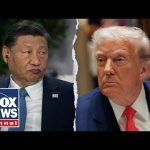In a recent discussion about the ongoing conflict in Ukraine, strategic military intelligence analyst and author of “Putin’s Playbook,” Rebecca, provided insights on the complexities of U.S.-Russia relations under President Trump’s administration. The conversation highlighted the erratic nature of Trump’s approach to both Vladimir Putin and Ukrainian President Volodymyr Zelenskyy, leaving many to ponder a crucial question: Why would Putin risk angering Trump with assaults on civilian targets in Ukraine?
Rebecca asserted that the lack of a consistent strategy in dealing with Putin is not solely Trump’s fault. It reflects the advice he has been receiving from advisers who may not fully grasp the mindset of the Russian leader. Putin is no ordinary adversary; he thinks and acts completely differently from an American leader would. Having put Russia’s military on a war footing long before the invasion, he holds significant leverage against both Ukraine and NATO. With this advantage, it seems unlikely that Putin will make any concessions, especially when the military balance appears heavily in his favor.
One point raised during the conversation was the effectiveness of economic sanctions, a tool that many believe the United States can wield against Russia. Critics often suggest that sanctions can curb Putin’s aggression. However, Rebecca pointed out a critical flaw in that argument. The reality is that the U.S. has been sanctioning Russia for over a decade with minimal success. Putin has weathered these financial storms, reforming his economy and strategically reducing dependence on Western technologies. Even countries like China and India, which some might expect to align with U.S. interests, have increased their dealings with Russia, further undermining the impact of American sanctions.
Delving into the possibility of a military response, the discussion painted a dire picture of the current situation. An immense sum of U.S. dollars has been poured into supporting Ukraine, yet the analyst contended that achieving victory over Russia remains mathematically impossible for Ukraine. Drawing an analogy, she likened the support to giving “Aspirin to a dead person.” The cost of this conflict is staggering, and the U.S. has depleted its military resources at an alarming rate by supplying them to Ukraine.
As the conversation wrapped up, Rebecca laid out three potential courses of action for the U.S. government. The first option involves continuing the current strategy of supplying weapons, which might prolong the conflict indefinitely. The second would advocate for a more immediate cessation of hostilities, allowing Putin to achieve his goals more quickly, ironically saving more Ukrainian lives in the process. Lastly, Rebecca suggested a radical shift—simply stepping back from the conflict altogether and letting the situation unfold. This stark approach would require an emotional detachment from the tragic images and stories that dominate the headlines.
The fundamental takeaway from this analysis emphasizes the deep and tangled web of Russian politics and the need for a clear-headed understanding of Putin’s motivations. As the situation in Ukraine continues to evolve, both lawmakers and citizens alike must be cognizant of the cold calculations driving actions on the global stage, rather than allowing emotions to cloud judgment. After all, Putin is a former KGB officer, operating with a level of rationality and strategy that is often underestimated. The path forward is fraught with uncertainty, but it is clear that understanding the dynamics at play is essential for making informed decisions about America’s role in this conflict.




